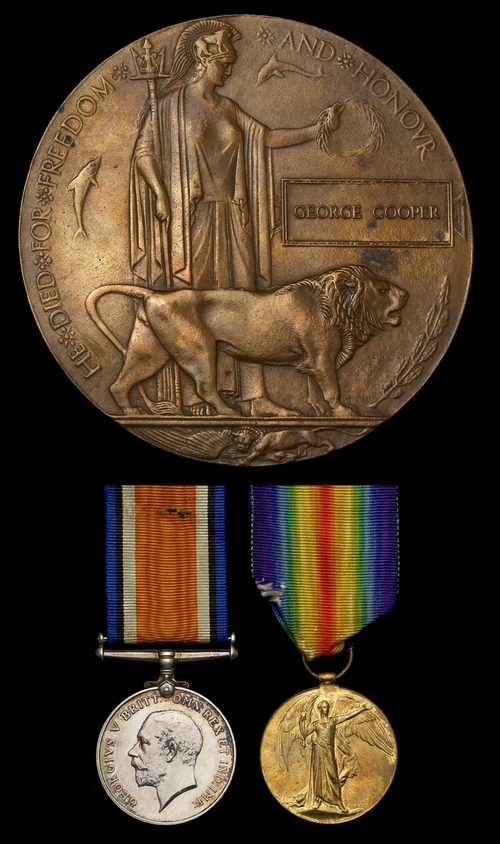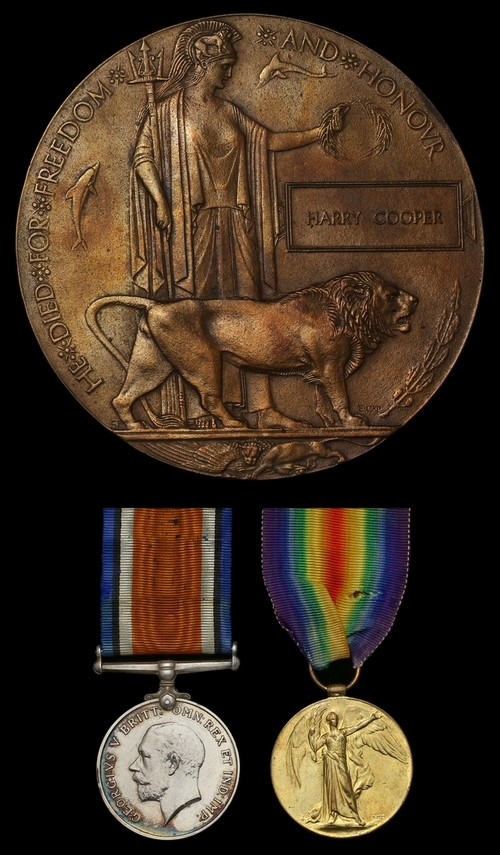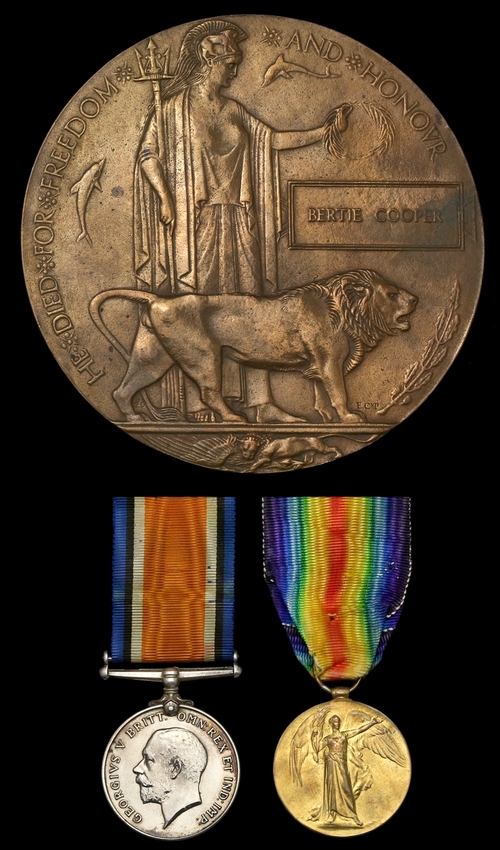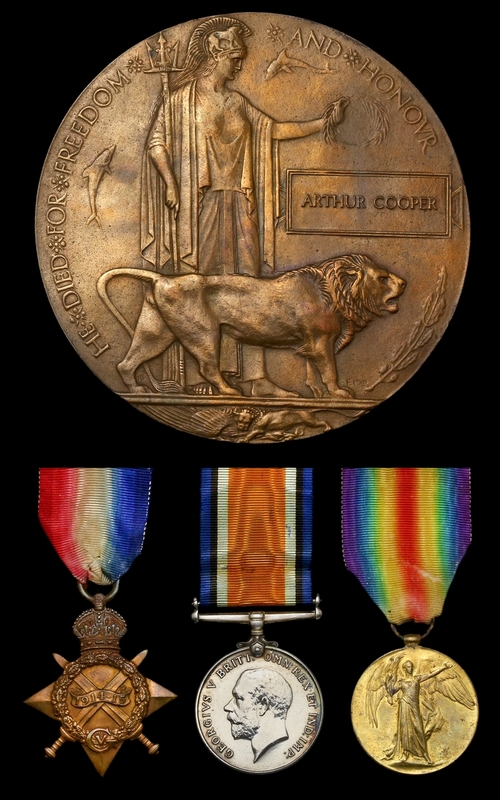Auction: 25003 - Orders, Decorations and Medals
Lot: 59
The terrible sacrifice occasioned by the Great War is painfully apparent in the grief surely suffered by Joseph Cooper, a jobbing gardener from Braintree, Essex. Having witnessed his wife’s early demise in the summer of 1898, he was left to raise their six sons and two daughters.
By 1911, he was living with four of those sons, Arthur, Harry, George and Bertie, a close knit family unit that was destined to be wiped out on the Western Front in less than a year.
A poignant family group:
Four: Private A. Cooper, 11th Battalion, Essex Regiment, who died of wounds in March 1917
1914-15 Star (3-2777 Pte. A. Cooper, Essex R.); British War and Victory Medals (3-2777 Pte. A. Cooper, Essex R.); Great War Bronze Memorial Plaque (Arthur Cooper), the reverse of the plaque fitted with a soldered metal pin for mounting purposes, otherwise good very fine
Three: Private B. Cooper, 9th Battalion, Essex Regiment, who was killed in action on the First Day of the Battle of the Scarpe, April 1917
British War and Victory Medals (26996 Pte. B. Cooper, Essex R.); Great War Bronze Memorial Plaque (Bertie Cooper), the reverse of the plaque fitted with a soldered metal pin for mounting purposes, otherwise good very fine
Three: Private G. Cooper, Essex Regiment, later 10th Battalion, Royal Irish Rifles, who was killed in action in 1917
British War and Victory Medals (2431 Pte. G. Cooper, Essex R.), Great War Bronze Memorial Plaque (George Cooper), the reverse of the plaque with remnants of solder work, otherwise good very fine
Three: Private H. Cooper, 9th (County of London) Battalion (Queen Victoria's Rifles), who was killed in action during the Somme Offensive in 1916
British War and Victory Medals (6707 Pte. H. Cooper, 9-Lond. R.), Great War Bronze Memorial Plaque (Harry Cooper), the reverse of the plaque with remnants of solder work, otherwise good very fine (Lot)
Arthur Cooper was born at Bocking in 1888 the son of Joseph Cooper, a widower, who was left raising six sons and three daughters before the Great War. Employed at a maltster, Crittall's, in 1911 the younger Cooper was living at Braintree and enlisted at Chelmsford for service in the Great War.
The first of his brothers to enter the war he did so in France on 30 May 1915 with the 9th Battalion, who saw action at Loos in 1915 and on the Somme in 1916. Cooper transferred to the 11th Battalion at some point after this, while they were part of the 6th Division, stationed in the Loos sector in March 1917.
During this period the Canadians took Vimy Ridge and the resulting German withdrawal saw a great deal of activity. Heavy exchanges of artillery were common along with intense trench raids and counter-raids on either side. Cooper was mortally wounded during this period, dying on 25 March 1917, being buried at Bethune Town Cemetery, just to the North-West of Loos. He was the second of his brothers to be killed in action, closely followed by two more.
Bertie Cooper was born at Braintree, Essex in 1895, the son of Joseph Cooper, a widower, who was left raising six sons and three daughters before the Great War. Cooper was the youngest of his father's sons and was living at the family home in Braintree when he was called up for service. He served with the 9th Battalion, Essex Regiment and was killed in action when that unit went into action in the First of the Battle of the Scarpe. The Battalion attacked north of the Arras - Cambrai Road on 9 April towards Feuchy although hard fighting meant that this objective was not achieved until the next day. Cooper did not live to see the objective taken but died on 9 April and is commemorated upon the Essex Memorial. He was the third of the Cooper brothers to be killed in action.
George Cooper was born at Braintree in 1893, the son of Joseph Cooper, a widower, who was left raising six sons and three daughters before the Great War. Working as a matt maker at a Matt Factory along with his brother, Harry Cooper, and enlisted with the Essex Regiment, joining two of his brothers upon the outbreak of the Great War.
He was transferred to the 10th Battalion, Royal Irish Rifles at some stage after entering the war in France. Stationed with this unit in August during the build up of forces around Ypres, in preparation for the Battle of Passchendaele, Cooper was killed in action on 5 August 1917. Commemorated upon the Ypres (Menin Gate) Memorial, he was the last of the Cooper brothers to be killed.
Harry Cooper was born at Braintree in 1890, the son of Joseph Cooper, a widower, who was left raising six sons and three daughters before the Great War. He worked with his brother Geroge as a matt maker at a Matt Factory and when the war broke out he enlisted at Chelmsford like his brother Alfred. However, he was not posted to the Essex Regiment but the 1/9th Battalion, London Regiment (Queen Victoria's Rifles).
This unit saw heavy action during the Somme Offensive being part of the Gommecourt Offensive during the First Day. Returning to the line in September they were in the trenches near Flers on 2 October 1916. It was here that Cooper was killed in action, the first of the four brothers to die in the Great War, he is commemorated upon the Thiepval Memorial.
Five of the six Cooper brothers died during the Great War with the only survivor serving in India.
Subject to 20% VAT on Buyer’s Premium. For more information please view Terms and Conditions for Buyers.
Sold for
£2,400
Starting price
£400
Sale 25003 Notices
'The Chelmsford Chronicle of 10 July 1931 includes the obituary of Joseph Cooper, who lost four of his sons during the Great War. It includes a photograph of him wearing the four groups of medals offered in this Lot.'











